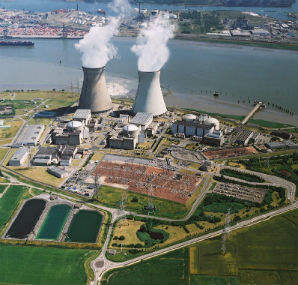Belgium's Federal Agency for Nuclear Control (Fanc) extended the commercial operating licences for units 1 and 2 of the Doel nuclear power plant by 10 years.

Belgium’s Federal Agency for Nuclear Control (Fanc) extended the commercial operating licences for units 1 and 2 of the Doel nuclear power plant by 10 years. In a statement on 1 October, Fanc said it had reviewed an action plan submitted in April by operator Electrabel and concluded that both units could be operated safely over the next decade, beyond their original 40-year design life. The Doel 1 licence has been extended until 15 February 2025 and the Doel 2 licence until 1 December 2025.
Under its action plan, Electrabel will undertake to ensure the safe operation of both reactors. Fanc said the plan incorporated elements related to the modernisation and management of ageing facilities and established a timetable, assigning a priority level for some actions, including an ultrasound inspection of the reactor vessel. Vessel inspections and other priority actions will be carried out at Doel 2 during an outage this autumn.
Fanc must approve any deviation from the action plan and schedule, and all priority actions must be completed before the reactors can start long-term operation. Electrabel must also submit the summary report from its fourth decennial safety review before the start of the long-term operation.
Fanc gave preliminary approval to the action plan in July, following an initial assessment and has since undertaken an in-depth analysis, concluding that the proposed modernisation programme is feasible. Doel 1 was shut down when its operating licence expired on 15 February and Doel 2 will reach the end of its 40-year lifetime in December. A law limiting the operating lives of Belgium’s nuclear reactors to 40 years was passed by the federal government in 2003, but in December 2014, the government agreed to extend the operating lifetimes of Doel 1 and 2. Both units are Westinghouse two-loop 433MWe (net) pressurised water reactor units.
Belgium has seven commercial nuclear reactor units, of which two, Doel 3 and Tihange 2, have been shut down since March 2014 following the discovery of defects in their reactor pressure vessels. They are scheduled to close when they reach the end of their 40-year lives. Tihange 2 will close in 2022 followed by Doel 3 in 2023 and Doel 4 and Tihange 4 in 2025. Engie operates all seven units through its Electrabel subsidiary. Electrabel wholly owns three of the units as well as 89.8% of another three (the other 10.2% being held by SPE). The remaining unit is jointly owned with France’s EDF.
Electrabel said on 1 October that it is reviewing plans for the operation of Doel 1, adding that the unit may be "available" from 15 December 2015. "Electrabel notes that the law governing the economic conditions for the 10-year lifetime extension of the Doel 1 and Doel 2 reactors has yet to be discussed and adopted by parliament. Electrabel and the federal government will also have to conclude an agreement on these conditions, the company said.
The tax burden
Earlier in September, Belgium’s Constitutional Court rejected Electrabel’s appeal against the legality of the nuclear tax imposed by the government for 2013. The company argued that the tax does not reflect deteriorating market conditions. In 2008, the government announced that NPP operators would have to make a one-off payment of €250m. However, in 2009 it postponed its planned nuclear phaseout but said it would charge operators an annual tax of €215-245m for the period 2010-2014.
In 2012, laws were passed doubling the level of tax. Operators filed a complaint with the Constitutional Court in June 2013 against the contribution set for 2012. However, the court rejected the appeal in July 2014 as "unfounded", prompting Electrabel to say it would reconsider the future of its nuclear activities in Belgium. The reactor operators lodged another appeal with the Constitutional Court for the 2013 tax, which has also now been rejected.
However, under an agreement in principle reached in July, Electrabel will pay annual fee of €20m ($22m) between 2016 and 2025 for the continued operation of the units. The tax to be paid by operators was also revised. Operators must pay a lump sum of €200m in 2015 and €130m in 2016. This was a compromise on fees of €100m in 2015 and €20m in 2016 set by a December 2006 law. For subsequent years, starting in 2017, the Belgian government will revise the contribution taking into account the evolution of the costs, production volumes and the price of electricity.
Photo: Doel 1&2
